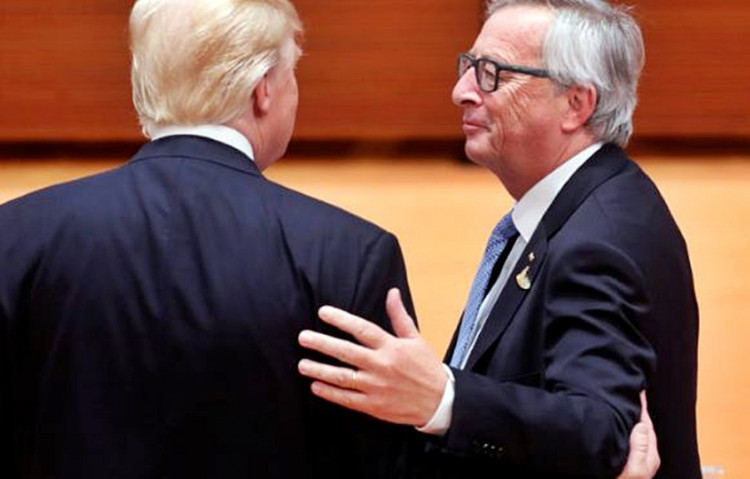The Europeans are under no illusion the temporary truce it agreed to with president Donald Trump means the threat of Trump's temper tantrum-driven tariffs against them is over for good.
Trump and European Commission President Jean-Claude Juncker yesterday said they agreed to work toward eliminating tariffs and barriers to trade, temporarily reducing tensions in a rancorous trade war.
Experts said the announcement was nothing more than "a deal to make a deal," which isn't much and harkens back to Trump's stormy relations Chinese president Xi Jin-ping. Xi found out in a quite painful manner in April that Trump doesn't mean what he says, especially when he says it effusively.
Last April, Trump praised a speech by Xi in which the Chinese leader indicated an willingness to compromise on the trade issues bedevilling both countries. Trump tweeted, "Very thankful for President Xi of China's kind words on tariffs and automobile barriers . . . also, his enlightenment on intellectual property and technology transfers. We will make great progress together!''
Trump, however, railed loudly against Xi a few hours before making this sweet tweet. He said Chinese companies pay a 2.5 percent tariff to import a car into the U.S. but American car companies have to pay a 25 percent tariff to sell into China.
"Does that sound like the free or fair trade. No, it sounds like STUPID TRADE -- going on for years!" Trump tweeted in anger. Two months later, or on July 6, Trump went through and imposed the first round of punitive duties on China.
Trump yesterday said the United States and the European Union (EU) had launched a "new phase" in their relationship. He said that the two major economies will immediately start negotiations on a number of areas, and will work towards "zero tariffs" on industrial goods.
"We agreed today, first of all, to work together towards zero tariffs, zero non-tariff barriers and zero subsidies for the non-auto industrial goods," said Trump at a joint press conference in the White House with Juncker.
Juncker said he and Trump agreed that as long as negotiations are ongoing, "we'll hold off further tariffs and reassess existing tariffs on steel and aluminum" put in place by the Trump administration. "This was a good, constructive meeting," noted Juncker.
Key details of the agreement weren't revealed, however. Economic experts said the deal represents a victory for the EU, which was expecting to be hit by new automobile tariffs as high as 25 percent.
Both leaders didn't reach an agreement on car tariffs and were careful not to reveal this but Juncker said no new tariffs will be assessed while negotiations go on. Economists have long held that tariffs on cars could be the biggest threat to the U.S. economy.






